| Website ini akan update setiap Selasa pagi. Nantikan Informasi terbaru setiap minggunya. | |||
|
Telah berlangsung Forum Mutu IHQN ke-9 di Jakarta yang diselenggarakan PKMK FK UGM bekerjasama dengan Eka Hospital. Forum Mutu kali ini mengusung tema Meningkatkan Daya Saing Layanan Kesehatan berbasis Managed Care. Pada seminar di Forum Mutu ini, dua orang pembicara dari Mayo Clinic juga didatangkan untuk membahas mengenai inovasi pada pelayanan di era managed-care dan sistem informasi sebagai alat untuk meningkatkan mutu pelayanan. Saat ini pembahasan topik peran direktur RSUD dengan Dinkes dan lembaga lainnya di pusat maupun daerah masih terus bergulir. Ada pendapat bahwa selama ini meskipun hubungan tersebut terlihat baik-baik saja, namun secara fungsional ada yang belum optimal. Dinas Kesehatan perlu diperkuat posisinya sebagai lembaga regulator, termasuk dalam mengawasi dan membina RS Daerah. Disisi lain, RS daerah sebagai bagian dari sistem kesehatan di daerah perlu mengikuti tatanan sistem kesehatan, dimana Dinkes sebagai leader-nya. + Artikel Penelitian Access to specialist advice remains a barrier for primary care providers (PCPs) and their patients. Virtual consultations have been used to expedite access. + Buku by NHS Confederation, The Academy of Medical Royal Colleges, National Voices Latar belakang ditulisnya buku ini adalah adanya tantangan terbesar bagi pelayanan kesehatan, yaitu kebutuhan meredesain pelayanan untuk memenuhi kebutuhan pasien, meningkatkan mutu dan memberikan nilai yang lebih baik bagi masyarakat. Dari berbagai wawancara terhadap berbagai pihak, disimpulkan bahwa ada enam prinsip pokok yang harus dilaksanakan dalam melakukan konfigurasi ulang pelayanan kesehatan. Selain memberikan saran bagi para kepala wilayah, buku ini juga memberikan saran bagi pimpinan nasional. Sheri Fink, 10 September 2013, Random House LLC Publisher. Harga: IDR 204.262 + Arsip Pengantar Minggu Lalu |
|||
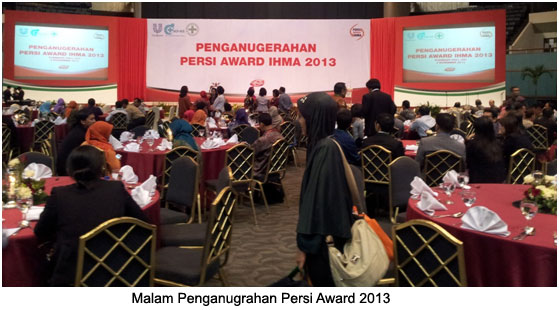 |
Malam Penganugrahan PERSI Award 2013 | 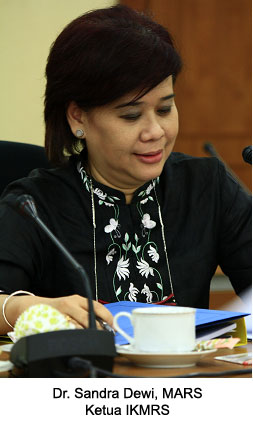 |
Ikatan Konsultan Manajemen Rumah Sakit (IKMRS) |
Rumah Sakit Bergerak Senilai Rp23 Miliar Ambruk
 Jakarta, Aktual.co — Rumah Sakit Bergerak (RSB) senilai lebih dari Rp23 miliar yang dibangun pemerintah di Tiakur, ibu kota Kabupaten Maluku Barat Daya (MBD), Maluku, sejak tahun 2012, tiba-tiba ambruk. Diduga akibat struktur tanah pondasi bangunan yang labil.
Jakarta, Aktual.co — Rumah Sakit Bergerak (RSB) senilai lebih dari Rp23 miliar yang dibangun pemerintah di Tiakur, ibu kota Kabupaten Maluku Barat Daya (MBD), Maluku, sejak tahun 2012, tiba-tiba ambruk. Diduga akibat struktur tanah pondasi bangunan yang labil.
“Rusaknya pondasi bangunan yang didirikan di atas tanah timbunan namun diduga kurang padat ini telah mengakibatkan lantai RSB bergerak turun dan ikut menyebabkan seluruh dinding hingga atapnya ikut ambruk,” kata salah satu warga Tiakur, Olaf Unaweckli yang dihubungi dari Ambon, Sabtu (16/11) malam.
Bangunan ini disebut Rumah Sakit Bergerak sebab konstruksinya sangat mudah dibongkar-pasang ketika akan dipindahkan ke lokasi lain sesuai kebutuhan tapi tiba-tiba ambruk pada Sabtu (16/11) sekitar pukul 11.00 WIT.
Olaf mengatakan, ada dua pasien yang sementara menjalani rawat inap saat terjadi musibah tersebut ikut tertimpa reruntuhan material bangunan karena yang paling parah kerusakannya adalah ruang pasien bersama ruang laboratorium.
Bencana ini juga menyebabkan sejumlah peralatan medis diduga kuat ikut mengalami kerusakan seperti peralatan rontgen dan radiologi. Para petugas kemudian mengevakuasi dua pasien yang sedang rawat inap ini ke Puskesmas Tiakur berserta seluruh peralatan canggih milik RSB Tiakur.
Sementara dr. Falda Laipeny bersama dua rekan dokter pegawai tidak tetap (PTT) yang bertugas di RSB Tiakur belum bisa dikonfirmasi untuk mendapatkan penjelasan resmi dari mereka.
“Karena kondisi tanahnya tidak rata, maka ketinggian pondasi RSB pada bagian belakangnya mencapai 1 meter lebih dan bagian tengah hingga depannya setinggi 60 Cm, namun diduga penimbunannya tidak disertai pemadatan sehingga tidak mampu menahan beban lantai dan bangunan yang berat,” kata Olaf.
Sebab dasar bangunan RSB menggunakan lempengan besi yang rata atau plateser kemudian dipasangai keramik lagi pada bagian lantainya ditambah dengan beban berat dari bagian dinding dan atap, namun struktur tanahnya labil membuat bangunan ini tidak bisa bertahan lama.
“RSB Tiakur dikerjakan sejak tahun 2012 dan mulai dioperasikan awal tahun ini, namun kalau kita masuk di dalamnya dan berjalan selalu terdengar bunyi kresek di bagian lantai, dan musibah hari ini berawal dari runtuhnya lantai dasar bangunan hingga ikut menarik dinding dan atapnya,” jelas Olaf. (Ant)
Sumber: aktual.co
Hospital where staff were bullied into fiddling figures to hide cancer treatment delays is put into special measures
- Colchester Hospital University NHS Foundation trust in special measures
- CQC report found number of cancer patients suffered ‘undue delays’
- Inspectors also found there were ‘inaccuracies’ with waiting time data
By James Rush
A hospital trust at the centre of a police investigation over allegations staff were forced to change cancer waiting times data has been placed in special measures.
Last week it was revealed the head of cancer services at Colchester Hospital University NHS Foundation Trust had been put on leave after a report from the Care Quality Commission (CQC) suggested a number of cancer patients had suffered ‘undue delays’.
CQC inspectors found that there were ‘inaccuracies’ with waiting time data relating to cancer treatment.
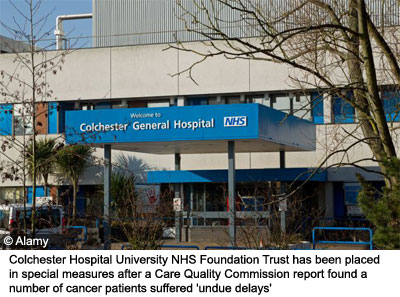 Staff told inspectors they were ‘pressured or bullied’ to change data relating to patients and their treatment to make it seem as though people were being treated in line with national guidelines.
Staff told inspectors they were ‘pressured or bullied’ to change data relating to patients and their treatment to make it seem as though people were being treated in line with national guidelines.
As a result some patients may not have had the treatment they needed in time, according to the CQC.
The Daily Mail last week reported how Rachel West, who is in charge of cancer services at the trust, had not been seen at work for several weeks, although the trust denied she had been suspended. Insiders said, however, she was on ‘special leave’.
The health sector regulator, Monitor, has now put the trust in special measures ‘to ensure all its patients receive good quality care’.
A formal investigation by Monitor found the trust had breached its licence to provide health services.
Under special measures, the trust will be required to ‘put right the patient quality, safety and governance concerns highlighted by the CQC’, Monitor said.
An improvement director will also be appointed by Monitor to ensure the trust turns itself around.
The hospital will also be matched with a high-performing trust which can offer support and expertise.
The trust must also publish and update an action plan that can be viewed by the public, Monitor said.
Adam Cayley, regional director for Monitor said: ‘Following the urgent actions already taken to safeguard patients at the trust we have stepped in formally to assure the health and wellbeing of patients using the cancer pathway at Colchester.
‘The trust has been given an explicit set of actions to improve the service it offers patients. We will be monitoring progress closely and we will not hesitate to take further regulatory action if required.
‘The leadership of the trust will be reviewed as part of our scrutiny of the trust’s governance arrangements and, if necessary, further regulatory action will be taken.’
Trust chief executive, Dr Gordon Coutts, said: ‘Everyone at the trust was extremely concerned about the problems identified in the CQC report.
‘We are truly sorry that in some cases cancer patients, their carers and families have not been given the high quality of care this trust always aims to provide.
| WHAT BEING IN SPECIAL MEASURES MEANS FOR COLCHESTER HOSPITAL UNIVERSITY NHS FOUNDATION TRUST |
| – Monitor has ordered the trust to ‘put right the patient quality, safety and governance concerns highlighted by the CQC’
– The regulator will appoint an Improvement Director to ensure the trust ‘turns itself around’ – The trust will be matched with a high-performing trust which can offer support and expertise ‘in delivering improvement to the cancer pathway’ – The trust will be required to publish and regularly update an action plan that can be viewed by the public – The regulator has also imposed an additional licence condition to make sure the trust has the ‘necessary capability in place to run the trust’. The regulator said: ‘If the leadership of the trust fails to act appropriately, this condition allows Monitor to take further action’ |
‘We have already taken action in response to the findings of the CQC report and we are continuing to address all of the concerns that were raised.
‘Our priority is the safety and well-being of all our patients.’
Dr Coutts said the trust was contacting all 30 patients – or their next of kin where patients have died – identified by the CQC report.
Chief inspector of hospitals, professor Sir Mike Richards, said: ‘We welcome Monitor’s decision to accept my recommendation to place Colchester Hospital University NHS Foundation Trust in special measures.
‘I am pleased that information from CQC’s inspection has resulted in the action that is being taken by Monitor to improve services at the trust. CQC will continue to monitor the trust in line with its regulatory responsibilities and this will include further inspections.’
Last week a spokesman for Essex Police said it had been contacted by the CQC and was reviewing the information to establish whether a criminal investigation was necessary.
Every year around 6,000 people go to Colchester Hospital University NHS Foundation Trust to be treated for cancer.
Unison regional head of health Tracey Lambert said: ‘The decision to take Colchester Hospital into special measures is the right one.
‘The trust board has lost the confidence of patients and the public in north east Essex and people want to see strong, positive action to improve health care at the hospital.
‘Unison members alerted executive directors at the hospital that they were being bullied into falsifying data relating to the treatment of cancer patients, but their concerns were not dealt with.
‘We know that our members in other departments also believed they would not be listened to if they spoke out about their fears. Unison repeatedly made this point to the trust .
‘In light of what has happened at Colchester, there is a need for a significant change of leadership and we look forward to working with the new regime.’
Police officer died after losing five litres of blood during ‘disastrous’ childbirth at hospital placed in special measures
A police officer died following a ‘disastrous’ childbirth at Colchester General Hospital, an inquest has today heard.
Diane Patt, 34, died just hours after giving birth to her second child at the hospital in September 2011.
Mrs Patt, a police constable based near to her home in Colchester, Essex, suffered a ‘massive haemorrhage’ losing five litres of blood.
Today an inquest at Chelmsford Coroners’ Court heard damning criticism from hospital staff about failures to replace lost blood.
Professor Mohammed Khaled, consultant on call at the hospital on the night PC Patt died, said: ‘I did not have any concerns because I thought the blood had been replaced.
‘We expect most women to recover, even from such blood loss, and it is very unfortunate that she did not get the blood replacement. I do believe if she had been given blood, she would still be with us.’
PC Patt was admitted to Colchester Hospital on the evening of September 18, 2011.
She gave birth by ventouse at 8.20pm, following a failed forceps delivery, but sadly died just hours later at 11.57pm. Her newly-born daughter survived.
A post-mortem gave the cause of death as a massive haemorrhage which triggered cardiac arrest.
PC Patt had been keen to have a normal delivery following a caesarian section for the birth of her first child. But problems came when a qualified registrar conducted a failed forceps delivery with Neville Barnes forceps.
Professor Khaled said: ‘Seeing the report, it could have been better. The registrar was not able to use Keilland’s forceps – she should have called me.
‘I was busy in another room. She did not even tell me she was going to use them.’
Prof Khaled had been busy writing notes yards away in a neighbouring room.
He explained his weekend on call had been ‘horrendous’ with only brief opportunities to catch up on paperwork.
He said: ‘I commenced duty at 8.30am on Saturday, September 17.
‘Unfortunately, that weekend was a horrendous weekend where I spent most of my time in hospital.’
Prof Khaled returned home shortly after helping stitch up PC Patt following her daughter’s birth but was called back by panicked midwives.
He said: ‘She rang me and said “Khaled they did not ask me to call you but I would like you to come straight away as we need your calming hands”.
‘That call indicated disaster as she is not someone who panics. For her to call me without the doctors asking means a big problem.’
Coroner Caroline Beasley-Murray suggested notes revealed ‘a bit of light-heartedness’ between staff as they looked to stabilise PC Patt’s condition.
Widower Sergeant Major Jason Patt, of Colchester’s 7th Parachute Regiment, Royal Horse Artillery, was in court alongside other members of PC Patt’s family.
The inquest, which is scheduled for three days, continues.
Source: dailymail.co.uk
Calo di Rumah Sakit itu Banyak
 Timlo.net — Wakil Gubernur DKI Jakarta Basuki Tjahja Purnama (Ahok) mengakui masih banyaknya calo Kartu Jakarta Sehat (KJS) di sejumlah rumah sakit di ibu kota. Modus para calo, ujar Ahok, yakni menawarkan langsung jasa pembuatan KJS kepada pasien agar bisa membayar biaya rumah sakit dengan murah.
Timlo.net — Wakil Gubernur DKI Jakarta Basuki Tjahja Purnama (Ahok) mengakui masih banyaknya calo Kartu Jakarta Sehat (KJS) di sejumlah rumah sakit di ibu kota. Modus para calo, ujar Ahok, yakni menawarkan langsung jasa pembuatan KJS kepada pasien agar bisa membayar biaya rumah sakit dengan murah.
“Calo di rumah sakit itu banyak. Kita sudah berusaha tangkap. Hampir semua rumah sakit itu ada calonya. Mereka itu membohongi pasien dengan iming-iming, ‘mau nggak saya bisa urus KJS kamu bisa bayar murah’,” kata Ahok di RSUP Persahabatan, Rawamangun, Jakarta Timur, Rabu (13/11).
Maraknya penipuan pasien atas nama KJS, menurut Ahok, akan terus diperbaiki. Menurut Ahok, Pemda DKI Jakarta juga terus berbenah untuk perbaikan layanan KJS.
“KJS itu bagus dan sudah diperbaiki, terutama tarif untuk dinas. Tiap 6 bulan dievaluasi hasilnya,” ujar Ahok.
Bentuk riil yang akan terus bertambah adalah jumlah kamar untuk KJS di tiap rumah sakit. Meski begitu, menurut Ahok, pihaknya juga akan berusaha memperbaiki tarif layanan, agar pihak rumah sakit tidak dirugikan.
Selain itu, kata Ahok, dengan adanya perbaikan tarif diharapkan pihak swasta juga ikut dengan program andalannya ini.
“Kita mau tambah kamar sebetulnya. Untuk tarif akan diperbaiki. Jadi persoalan ada orang tidak mampu berobat, rumah sakit menyiapkan untuk itu. Namun dengan tarif diperbaiki kita yakin pihak swasta akan ikut serta di dalamnya,” kata mantan Bupati Belitung Timur itu.
[ren]
Sumber: timlo.net
Colchester hospital put into special measures over cancer care claims
Move comes as hospital is investigated over allegations that staff changed records about delays in treatment
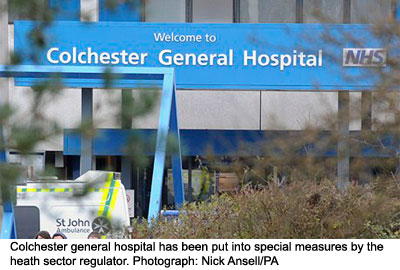 The hospital at the centre of an investigation into allegations that it falsified the appointment and treatment times of cancer patients has been put into special measures.
The hospital at the centre of an investigation into allegations that it falsified the appointment and treatment times of cancer patients has been put into special measures.
Monitor, the heath sector regulator, on Thursday said it would send an “improvement director” to the NHS trust running Colchester general hospital, and appoint an as-yet-unnamed high-performing trust to deliver changes to the “cancer pathway” followed by about 6,000 patients a year at Colchester and at the town’s Essex county hospital.
It also hinted that there may be later changes in the trust’s leadership. Essex police are considering whether a criminal investigation is needed as a result of last week’s scathing report that contained allegations of bullying and pressurising of staff to falsify details of patients’ cancer care.
Adam Cayley, regional director for Monitor, said: “Following the urgent actions already taken to safeguard patients at the trust we have stepped in formally to assure the health and wellbeing of patients using the cancer pathway at Colchester.
“The trust has been given an explicit set of actions to improve the service it offers patients. We will be monitoring progress closely and we will not hesitate to take further regulatory action if required.”
Cayley added: “The leadership of the trust will be reviewed as part of our scrutiny of the trust’s governance arrangements and, if necessary, further regulatory action will be taken.”
Sir Mike Richards, chief inspector of hospitals at the Care Quality Commission, responsible for last week’s report, said: “We welcome Monitor’s decision to accept my recommendation to place Colchester hospital university NHS foundation trust in special measures.
“I am pleased that information from CQC’s inspection has resulted in the action that is being taken by Monitor to improve services at the trust. CQC will continue to monitor the trust in line with its regulatory responsibilities and this will include further inspections.”
Gordon Coutts, chief executive of the Colchester hospital university foundation trust, repeating last week’s apology to cancer patients, said it was already taking action in response and continuing to address all the concerns.
“Our priority is the safety and wellbeing of all our patients. The additional advice and support that we will receive as a result of the announcement by Monitor will help us to make the improvements that are needed quickly and effectively. Pairing us with another trust will also provide the opportunity to have a fresh pair of eyes to look at our services.” The trust board was holding a public meeting on Thursday to update local people on its response to the crisis and to take questions.
Tracey Lambert, regional head of health for Unison, whose members blew the whistle and were praised by the CQC, said: “The decision to take Colchester hospital into special measures is the right one. The trust board has lost the confidence of patients and the public in north-east Essex and people want to see strong, positive action to improve healthcare at the hospital.
“Unison members alerted executive directors at the hospital that they were being bullied into falsifying data relating to the treatment of cancer patients, but their concerns were not dealt with,” said Lambert. “We know that our members in other departments also believed they would not be listened to if they spoke out about their fears. Unison repeatedly made this point to the trust.
“In light of what has happened at Colchester, there is a need for a significant change of leadership and we look forward to working with the new regime.”
The initial CQC investigation looking at a sample of records dating back to the end of 2011 found 30 patients may have been put at risk but they or their next of kin were only notified and offered a review of treatments by the trust the day before the critical report was published. NHS England and the local group commissioning services from the trust are now conducting a more detailed check on records dating back to 2010. Although the trust last week said no one had been suspended, the head of cancer services, Rachael West, is reportedly on special leave.
Source: theguardian.com
Rumah Sakit Diminta Tak Sepelekan Pasien Jamkesmas
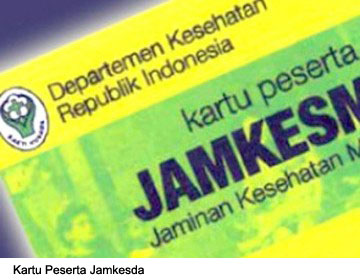 REPUBLIKA.CO.ID, BANDARLAMPUNG — Rumah sakit diminta tidak memandang sebelah mata pasien yang menggunakan Program Jaminan Kesehatan Masyarakat (Jamkesmas).
REPUBLIKA.CO.ID, BANDARLAMPUNG — Rumah sakit diminta tidak memandang sebelah mata pasien yang menggunakan Program Jaminan Kesehatan Masyarakat (Jamkesmas).
Permintaan itu datang dari anggota DPRD Provinsi Lampung, Watoni Noerdin. “Penanganannya harus sama seriusnya, meskipun ada perbedaan, namun harus seoptimal mungkin sehingga tidak menyengsarakan warga tak mampu itu,” kata Watoni, berkaitan dengan kondisi penanganan pasien Jamkesmas itu di Bandarlampung, Selasa (12/11).
Ia mengaku sempat meninjau para pasien pengguna Jamkesmas di RSU Daerah dr Abdul Moeloek (RSUDAM) Bandarlampung pada Senin (11/11). Menurut fungsionaris Fraksi PDI Perjuangan DPRD Lampung itu, masyarakat yang berobat berharap untuk sembuh, sama seperti halnya pasien lain yang menggunakan fasilitas selain Jamkesmas atau lainnya.
Ia menyoroti pelayanan bagi para pasien Jamkesmas tersebut, seperti mengenai penjadwalan pemeriksaan dokter spesialis harus tetap berimbang antara pasien VIP dengan pengguna Jamkesmas.
“Jangan tidak ada perbandingannya sehingga membuat pasien Jamkesmas terbengkalai dengan harapan yang tidak jelas,” kata dia lagi.
Apalagi, ia melanjutkan, sebentar lagi akan memperingati Hari Kesehatan Nasional, sehingga semua bentuk pelayanan kesehatan seharusnya sudah memberikan hasil yang baik di mata masyarakat.
Ditemui terpisah, Sri Rahayu, warga Adiluwih Kabupaten Pringsewu, salah satu pasien Jamkesmas menyesalkan pihak RSUDAM karena suaminya sudah hampir sebulan belum ditangani dokter spesialis.
“Padahal penyakitnya sudah diketahui, tetapi penanganannya kok belum maksimal,” tuturnya.
Ia berharap, suaminya dapat ditangani secara serius sehingga bisa cepat sembuh dan pulang ke rumah.
Sumber: republika.co.id
RSUD Malinau Jadi Rumah Sakit Rujukan
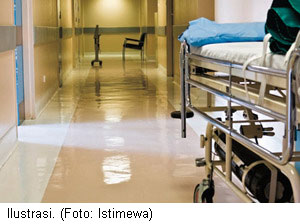 MALINAU, tribunkaltim.co.id – Perhatian Pemkab Malinau atas kesehatan masyarakatnya dapat dilihat dari salah satu dari tiga komitmen Pemkab Malinau, yakni menjadikan Rumah Sakit Umum Daerah (RSUD) Malinau sebagai rumah sakit rujukan dengan berusaha melengkapi peralatan, meningkatkan SDM tenaga medisnya dan memaksimalkan pelayanan rumah sakit kepada masyarakat. Karena disadari masyarakat Malinau memerlukan pelayanan kesehatan yang bermutu.
MALINAU, tribunkaltim.co.id – Perhatian Pemkab Malinau atas kesehatan masyarakatnya dapat dilihat dari salah satu dari tiga komitmen Pemkab Malinau, yakni menjadikan Rumah Sakit Umum Daerah (RSUD) Malinau sebagai rumah sakit rujukan dengan berusaha melengkapi peralatan, meningkatkan SDM tenaga medisnya dan memaksimalkan pelayanan rumah sakit kepada masyarakat. Karena disadari masyarakat Malinau memerlukan pelayanan kesehatan yang bermutu.
“Saat ini kita sudah melakukan langkah-langkah dalam merealisasikan komitmen tersebut. Sekarang kita berusaha untuk meningkatkan perlengkapan, peralatan kesehatan di RSUD Malinau. Kemudian, kita juga saat ini sedang mempersiapkan sumber daya manusia (SDM) untuk menjadi tenaga kesehatan. lalu kita juga berusaha semaksimal mungkin untuk memberikan pelayanan kesehatan yang terbaik kepada masyarakat,” pungkasnya.
Dilain hal, Kepala Dinas Kesehatan, dr John F Rundupadang mengungkapkan, dalam upaya Pemkab Malinau memaksimalkan bidang kesehatan di Malinau, pihaknya saat ini sudah menyusun langkah-langkah dalam merealisasikan hal tersebut, yakni mengawalinya dengan memaksimalkan pelayanan puskesmas di kecamatan.
Salah satunya dengan mengoptimalkan kehadiran petugas kesehatan di kecamatan. Untuk itu, mulai tahun depan, Dinkes mewajibkan setiap petugas kesehatan di setiap puskesmas untuk memiliki daerah binaan wilayah tertentu. Mereka nantinya akan bertugas melakukan pembinaan di skala kecil seperti RT, RW atau pun desa pada wilayah pedalaman.
Pihak Dinkes pun tak segan-segan menindak tegas bagi petugas kesehatan yang tidak menjalankan tugas mereka dengan baik.
“Mereka-mereka yang tidak setia akan kita berhentikan. Saya kira masih banyak yang antre. Kita ingin yang betul-betul berkomitmen. Yang tidak berkomitmen kita keluarkan dari jalur yang kita buat,” tegasnya. (*)
Sumber: tribunnews.com
Texas Reproductive Health Cuts Deny Women Access to Care
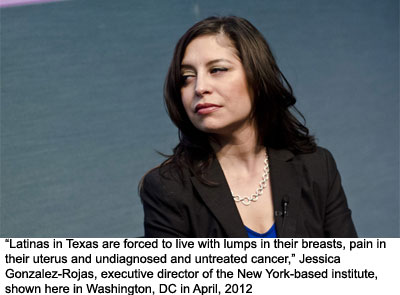 About a quarter of state-funded family-planning clinics in Texas’s Lower Rio Grande Valley closed after funding was cut in 2011, forcing women to forgo breast exams, Pap smears and contraception, according to a report by an advocacy group.
About a quarter of state-funded family-planning clinics in Texas’s Lower Rio Grande Valley closed after funding was cut in 2011, forcing women to forgo breast exams, Pap smears and contraception, according to a report by an advocacy group.
The spending reductions, which came before lawmakers approved new restrictions on abortion this year, have been especially deep in counties on the southeastern border with Mexico, one of the poorest regions in the U.S., according to the report today by the Center for Reproductive Rights and National Latina Institute for Reproductive Health.
“Latinas in Texas are forced to live with lumps in their breasts, pain in their uterus and undiagnosed and untreated cancer,” Jessica Gonzalez-Rojas, executive director of the New York-based institute, said at a news briefing in Austin.
The legislature cut family-planning funds by about two-thirds to $37.9 million for the 2011-2013 budget, according to the report. Over the next two years the state plans to spend $143 million, expanding primary-care services to an additional 170,000 women.
Nine of 32 family-planning clinics in the Lower Rio Grande Valley closed, leaving fewer options for women, according to the report. Others scaled back hours or raised prices. Health concerns that aren’t diagnosed early can become more serious, resulting in the need for more costly care.
‘Distorted’ Picture
Abortion-rights supporters “are milking this issue and they’ve painted a very distorted picture of the situation facing low-income women,” said Joe Pojman, executive director of the Texas Alliance for Life, which opposes abortion. “There are more family-planning dollars available than in any time in the recent past.”
A government-run website, TexasWomensHealth.org, cites 66 doctors and other providers within 30 miles of Brownsville, Pojman said. Brownsville is a border city at the state’s southeast tip.
Those providers often are too expensive and inconvenient for many women, said Kristine Hopkins, an investigator with the Texas Policy Evaluation Project, an affiliate of the University of Texas at Austin that studies state legislation.
Fiery Argument
Texas became a center of the abortion debate this year after Republicans passed a law requiring clinics to meet structural standards similar to those for hospitals, along with other restrictions.
Women’s clinics in at least five Texas cities stopped offering abortions after a U.S. appeals court on Oct. 31 temporarily let the state enforce a rule that requires doctors who perform the procedure to be able to admit patients to nearby hospitals.
Texas Governor Rick Perry, in a June 27 speech to anti-abortion activists, said, “The ideal world, of course, is a world without abortion.”
While abortion clinics have closed, Texas has other alternatives for women, including pregnancy resource centers, faith-based adoption agencies and thousands of Texas Women’s Health Program providers, said Josh Havens, a Perry spokesman.
The report by the Latina and Reproductive Rights groups was based on interviews with 188 women in four counties, where more than a third of the female population lives in poverty and more than 90 percent are Hispanic, U.S. Census Bureau figures show.
Test Choice
When she meets with Rio Grande Valley women to discuss health issues, fewer than a third have had Pap smears aimed at detecting cancer, said Paula Saldana, 36, a volunteer health-care educator from Brownsville who was at the news briefing.
“I had the privilege to decide how many children I would have and I want other women to have that same choice,” Saldana said in an interview.
Last year, Texas’s Health and Human Services Commission estimated that during 2014 and 2015, poor women would have almost 24,000 more babies as a result of the state funding cuts.
There were 66,098 abortions in Texas in 2012, an 8.6 percent decline from 2011, according to state figures.
To contact the reporter on this story: David Mildenberg in Austin at [email protected]
To contact the editor responsible for this story: Stephen Merelman at [email protected]
Source: bloomberg.com
End-of-life care initiative halves patient deaths in hospital
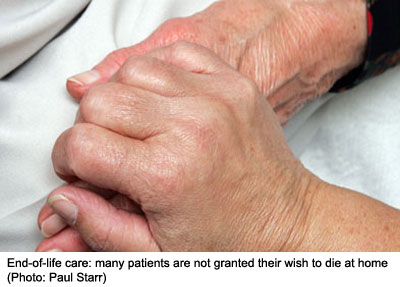 A GP whose practice greatly increased the number of patients able to choose to die in their own home has called for more surgeries to take part in a national end-of-life care scheme.
A GP whose practice greatly increased the number of patients able to choose to die in their own home has called for more surgeries to take part in a national end-of-life care scheme.
Coastal Medical Group in Morecambe, Lancashire halved the numbers of its terminally ill patients dying in hospital and almost doubled the number dying in their normal residence.
It followed a push by practice staff to seek special palliative care training and accreditation by the National Gold Standards Framework (GSF) in End of Life Care.
Dr Andrew Foster, a partner at the practice, told GP more practices could help patients plan their end-of-life care by working towards the standards.
Nationally, about 51% of people die in hospital, despite most people wanting to die at home.
The not-for-profit GSF centre aims to improve quality of life in patients’ final years and help more people die where they choose.
The centre offers palliative care training to GP practices, care homes, other community services and hospitals, and formal GSF accreditation is awarded to providers that can prove high standards of end-of-life care.
Coastal Medical Group is one of only nine practices that have achieved accreditation since it launched in 2012.
Dr Foster, who leads the practice’s palliative work, said working towards the accreditation led to a five-fold increase in the number of the practice’s patients on the palliative care register when they died.
Twice as many carers have had their needs assessed, while the number offered bereavement support and advice has risen from 5% to 77%.
Starting discussions
Dr Foster said: ‘For patients, it means they can predict things a little bit more, a little less reactively, and more proactively. They get early involvement with Macmillan nurses, for instance.
‘It prompts GPs to have discussions with family and patients about where they’d like to be cared for in future. Then we can put services in early to try to keep patients in their home.’
For advice and support, patients at the practice can contact a named palliative clerk, who is familiar with their situation, rather than use the routine practice phone numbers where they may have to wait for a consultation.
The practice holds a list of patients’ carers and ensures local services are informed so they can help give carers some respite when possible.
Practices have also adjusted their visits roster to ensure where possible GPs can see the same patients with palliative care needs, to improve continuity.
Dr Foster encouraged other practices to sign up to GSF training and seek accreditation. ‘If more practices could be involved with it, going for higher standards is only going to be good for patients.’
He said although some may be ‘put off’ by the amount of initial work required for GSF accreditation, the ageing population, increased expectations on end-of-life care and the need to keep people out of hospital meant it was something practices should consider.
Each year, 75% of cancer patients in England who die in hospital – 36,000 people – had wanted to die in their home, according to a report by Macmillan Cancer Support, published last month.
Source: gponline.com
Report Rates Area Hospitals for Quality and Care
 A new report ranks nearly 4,500 hospitals nationwide, including all hospitals in Missouri, for quality of care and success by procedure. Springfield area hospitals are included in this ranking.
A new report ranks nearly 4,500 hospitals nationwide, including all hospitals in Missouri, for quality of care and success by procedure. Springfield area hospitals are included in this ranking.
Joining us this morning is Dr. Archelle Georgio in New York. Dr. Archelle will be talking about this new report from healthgrades.com. Dr. Georgio, you’re going to break down what you found in this extensive report. About 4,500 hospitals in the U.S. were rated.
That’s correct. We’re rating the hospitals across 31 different procedures and conditions. We make this information available to consumers because, guess what, the hospital quality across America’s hospitals is not equal. The decision of what hospital you go to really makes a difference in the outcome of your care.
Reporter: Springfield, Missouri does have a big hospital community here locally. What can you tell us about the hospitals in our area, and what did you find from your research?
Across the United States we found wide variation. We see it in Missouri of course, and there’s wide variation in Springfield. I’ll just point out some of the statistics that will maybe surprise you. We looked at three hospitals in your area and we looked at the complication rate for hip replacement surgery. It ranged from almost 3% to all the way up to almost 10%. We also looked at another three hospitals, another orthopedic surgery, and looked at their complication rate for total knee replacement. That difference rate was even more dramatic. It ranged from 5.3% all the way up to 17%. I think it reflects the fact that even within the same city you have such significant variation and it’s important to pick hospitals that are affiliated with doctors that have the best outcomes.
Reporter: In the study were you able to name and list those hospitals with those different ratings?
All of the hospitals in the area, and in Missouri and in the country are on the healthgrades.com site. Let me highlight one hospital that did particularly well, 5 star rated hospital for total hip replacement and total knew replacement. So maybe where you want to go if you need to get that surgery, and it’s Mercy Hospital Springfield. For the other conditions and procedures that we cover, they range from heart surgery to prostate surgery, all of that information there will be 5 star rated hospitals in your community for those conditions as well. It would be impossible to list them all, but I encourage people to go to the site and learn how to use it, so they can make the right decision for them and their family.
Reporter: What sort of other things do people need to be considering when they are scheduled for an appointment or they do have a procedure that they know they will have to face, again, what do they need to keep in mind when they’re considering which options are best for them?
I think the most important thing to think about is who your doctor is and making sure that your doctor is certified, is competent, specifically in the area that you need care. And so, the making sure that your doctor is affiliated with a 5 star rated hospital for that condition. And make sure to advocate for your own care. It’s when you have data and information at your fingertips that you can be the best advocate. Again, you can get all that information on healthgrades.com.
Dr. Archelle Georgio, thank you so much for being with us this morning.
Source: ozarksfirst.com



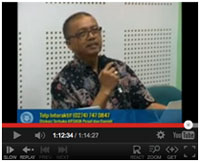 Diskusi Hubungan antara Direktur RSUD dengan Dinas Kesehatan dan Lembaga Lain
Diskusi Hubungan antara Direktur RSUD dengan Dinas Kesehatan dan Lembaga Lain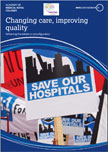 CHANGING CARE, IMPROVING QUALITY
CHANGING CARE, IMPROVING QUALITY FIVE DAYS AT MEMORIAL: LIFE AND DEATH IN A STORM-RAVANGED HOSPITAL
FIVE DAYS AT MEMORIAL: LIFE AND DEATH IN A STORM-RAVANGED HOSPITAL





